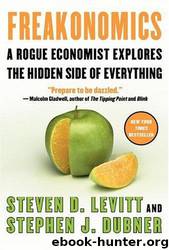FREAKONOMICS: A Rogue Economist Explores the Hidden Side of Everything by Levitt Steven

Author:Levitt, Steven [Steven, Levitt,]
Format: epub
Published: 2010-06-03T04:00:00+00:00
FREAKONOMICS: A Rogue Economist Explores the Hidden Side of Everything
Chapter 5
What Makes a Perfect Parent?
Has there ever been another art so devoutly converted into a science as the art of parenting?
Over the recent decades, a vast and diverse flock of parenting experts has arisen. Anyone who tries even casually to follow their advice may be stymied, for the conventional wisdom on parenting seems to shift by the hour. Sometimes it is a case of one expert differing from another. At other times the most vocal experts suddenly agree en masse that the old wisdom was wrong and that the new wisdom is, for a little while at least, irrefutably right. Breast feeding, for example, is the only way to guarantee a healthy and intellectually advanced child-unless bottle feeding is the answer. A baby should always be put to sleep on her back-until it is decreed that she should only be put to sleep on her stomach. Eating liver is either a) toxic or b) imperative for brain development. Spare the rod and spoil the child; spank the child and go to jail.
In her book Raising America: Experts, Parents, and a Century of Ad
vice About Children, Ann Hulbert documented how parenting experts contradict one another and even themselves. Their banter might be hilarious were it not so confounding and, often, scary. Gary Ezzo, who in the Babywise book series endorses an “infant-management strategy” for moms and dads trying to “achieve excellence in parenting,” stresses how important it is to train a baby, early on, to sleep alone through the night. Otherwise, Ezzo warns, sleep deprivation might “negatively impact an infant’s developing central nervous system” and lead to learning disabilities. Advocates of “co-sleeping,” meanwhile, warn that sleeping alone is harmful to a baby’s psyche and that he should be brought into the “family bed.” What about stimulation? In 1983 T. Berry Brazelton wrote that a baby arrives in the world “beautifully prepared for the role of learning about him- or herself and the world all around.” Brazelton favored early, ardent stimulation-an “interactive” child. One hundred years earlier, however, L. Emmett Holt cautioned that a baby is not a “plaything.” There should be “no forcing, no pressure, no undue stimulation” during the first two years of a child’s life, Holt believed; the brain is growing so much during that time that overstimulation might cause “a great deal of harm.” He also believed that a crying baby should never be picked up unless it is in pain. As Holt explained, a baby should be left to cry for fifteen to thirty minutes a day: “It is the baby’s exercise.”
The typical parenting expert, like experts in other fields, is prone to sound exceedingly sure of himself. An expert doesn’t so much argue the various sides of an issue as plant his flag firmly on one side. That’s because an expert whose argument reeks of restraint or nuance often doesn’t get much attention. An expert must be bold if he hopes to alchemize his homespun theory into conventional wisdom.
Download
This site does not store any files on its server. We only index and link to content provided by other sites. Please contact the content providers to delete copyright contents if any and email us, we'll remove relevant links or contents immediately.
| Biomathematics | Differential Equations |
| Game Theory | Graph Theory |
| Linear Programming | Probability & Statistics |
| Statistics | Stochastic Modeling |
| Vector Analysis |
Modelling of Convective Heat and Mass Transfer in Rotating Flows by Igor V. Shevchuk(6433)
Weapons of Math Destruction by Cathy O'Neil(6265)
Factfulness: Ten Reasons We're Wrong About the World – and Why Things Are Better Than You Think by Hans Rosling(4734)
A Mind For Numbers: How to Excel at Math and Science (Even If You Flunked Algebra) by Barbara Oakley(3301)
Descartes' Error by Antonio Damasio(3270)
Factfulness_Ten Reasons We're Wrong About the World_and Why Things Are Better Than You Think by Hans Rosling(3235)
TCP IP by Todd Lammle(3180)
Fooled by Randomness: The Hidden Role of Chance in Life and in the Markets by Nassim Nicholas Taleb(3105)
Applied Predictive Modeling by Max Kuhn & Kjell Johnson(3065)
The Tyranny of Metrics by Jerry Z. Muller(3065)
The Book of Numbers by Peter Bentley(2964)
The Great Unknown by Marcus du Sautoy(2691)
Once Upon an Algorithm by Martin Erwig(2641)
Easy Algebra Step-by-Step by Sandra Luna McCune(2628)
Lady Luck by Kristen Ashley(2576)
Practical Guide To Principal Component Methods in R (Multivariate Analysis Book 2) by Alboukadel Kassambara(2540)
Police Exams Prep 2018-2019 by Kaplan Test Prep(2540)
All Things Reconsidered by Bill Thompson III(2389)
Linear Time-Invariant Systems, Behaviors and Modules by Ulrich Oberst & Martin Scheicher & Ingrid Scheicher(2364)
